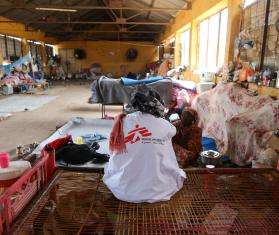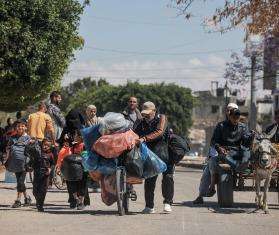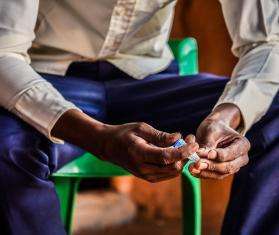Allowing pharmaceutical corporations to enforce patents would prolong the pandemic by preventing generic manufacturers from creating more affordable versions of medicines, vaccines, and diagnostics
NEW YORK/GENEVA, NOVEMBER 19, 2020—All governments, including the US, should support the request at the World Trade Organization (WTO) to waive certain intellectual property (IP) protections during the COVID-19 pandemic, said the international medical humanitarian organization Doctors Without Borders/Médecins Sans Frontières (MSF). If approved at the WTO level, the landmark request put forward by India and South Africa in October would allow all countries to choose to not grant or enforce patents on COVID-19 products, paving the way for more affordable generic versions of desperately-needed drugs, vaccines, and diagnostics. This requested IP waiver would apply to COVID-19-related patents throughout the duration of the pandemic—until global herd immunity is achieved.
“Countries need to use every tool available to make sure that COVID-19 medical products are accessible and affordable for everyone who needs them,” said Dr. Sidney Wong, executive co-director of MSF’s Access Campaign. “All COVID-19 health tools and technologies should be true global public goods, free from the barriers that patents and other intellectual property impose. We’re calling on all governments to urgently throw their support behind this groundbreaking proposal that puts human lives over corporate profits at this critical moment for global health.”
Since the start of the pandemic, pharmaceutical corporations have maintained their standard practice of rigid control over intellectual property rights and, in turn, their profits, while pursuing secretive and monopolistic commercial deals that exclude many developing countries from benefitting. For example, Gilead entered into restrictive bilateral licensing for one of the only drugs to have shown potential benefit to treat COVID-19, remdesivir, excluding nearly half of the world’s population from benefitting from price-lowering generic competition.
Additionally, several new and repurposed medicines and monoclonal antibodies being trialed as promising treatments for COVID-19 are already patented in many developing countries such as Brazil, South Africa, India, Indonesia, China, and Malaysia. And with the exception of one company, none of the COVID-19 vaccine developers have committed to treating IP any differently than the status quo. While some corporations have taken steps through licensing and technology transfer deals to use existing global manufacturing capacity to try and mitigate anticipated supply shortages of potentially successful vaccines, this has been the exception, and the licensing deals often come with clear limitations.
Preventing the enforcement of patents to overcome monopolies has proven effective in the past, like 20 years ago when patents were suspended in certain countries to allow the production of affordable generic HIV/AIDS drugs. This move saved millions of people’s lives. In 2001, at the height of the HIV/AIDS epidemic, the “Doha Declaration on TRIPS and Public Health” affirmed governments’ rights to take all necessary measures to eliminate patents and other IP barriers, putting governments in the driver’s seat so they can prioritize public health over corporate interests. This current waiver request to the WTO is a similar step to speed up the response to COVID-19.
“This bold step by governments offers the world a chance to avoid repeating the tragedy of the HIV/AIDS epidemic 20 years ago, when monopolies on lifesaving treatments saw people in high-income countries gain access to HIV medicines while millions in developing countries were left to die,” said Dr. Khosi Mavuso, medical representative for MSF in South Africa. “Overriding monopolies on COVID-19 medical tools will allow global collaboration to scale-up manufacturing, supply and access for everyone. With more than 1.3 million lives already lost to COVID-19, governments cannot afford to waste any more time waiting for voluntary moves by the pharmaceutical industry.”
At the last WTO meeting of the TRIPS Council (Trade-Related Aspects of Intellectual Property Rights) on October 15-16, Kenya and Eswatini joined India and South Africa in officially co-sponsoring the waiver. A total of 99 countries have welcomed and shown support overall. However, the waiver proposal is not being supported by multiple wealthy nations, including the US, the UK, Japan, Canada, Brazil, Australia, Norway, Switzerland, and the European Union. These are many of the same countries that have already bought up much of the COVID-19 vaccine and medicine supply—something low- and middle-income countries cannot afford to do.
“Governments need to ask themselves which side of history they want to be on when the books on this pandemic are written,” Wong said.




